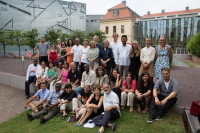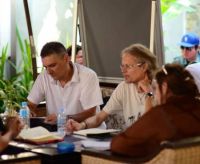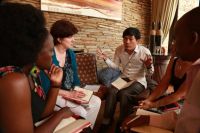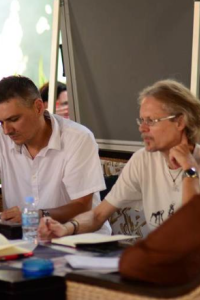
Participants in Berlin in July 2014.
(Image: Nelson Mandela Foundation)The international Mandela Dialogues process has seen the generation of a document (download here) that challenges many orthodoxies in what is called transitional justice theory and practice. It is published here as a contribution to deliberations in the many countries facing the challenge of reckoning with oppressive pasts.
Nelson Mandela Foundation Director of Research Verne Harris said: "Madiba gave us a mandate to do the difficult work of memory in reckoning with our pasts. This document draws on the experiences of ten countries to offer insights into what this difficult work entails and what the consequences are of neglecting it."

Group work in Phnom Penh, Cambodia, in March 2014.
(Image: Nelson Mandela Foundation)From November 2013 to July 2014 the Nelson Mandela Foundation and the GIZ Global Leadership Academy, the latter commissioned by the German Federal Ministry for Economic Cooperation and Development (BMZ), brought together 26 participants from ten countries to engage in a three-part dialogue series on memory work in contexts where oppression, violent conflict or systemic human rights abuses have taken place.
The dialogues offered an international forum to discuss the complex personal, collective and professional challenges facing those engaged in reckoning with the past.
Through different layers and modes of engagement the process sought to reinvigorate debates about memory work, and offer new approaches, new questions and challenges to existing paradigms.
About halfway into the process participants felt the need to generate a consensus statement on the objectives of memory work, and the fundamental principles for the practice of that work.
A draft document (download draft Berlin Declaration) was developed ahead of the final gathering in Berlin in July 2014 and became the focus of intense discussion and debate.

Group work at the Cradle of Humankind in November 2013.
(Image: Nelson Mandela Foundation)Fundamental differences emerged around the overarching objectives of memory work, the value of transitional justice discourses, and the meaning of fundamental terms like "justice", "democracy", "truth" and "reconciliation".
Subsequently the South American participants developed a position paper (download Manifiesto Revisado) for consideration. As the process came to an end it became clear that consensus remained elusive. This is reflected, and explored, in the final report about the Mandela Dialogues.
The Nelson Mandela Foundation has benefited greatly from the experience, reflecting long and hard on its own praxis, its mandate from Nelson Mandela, and its positioning within the South African tradition of "memory for justice".
The latter emerged in the late 1970s and crystalised in the struggles for liberation during the profoundly damaging 1980s. And it was the call to memory for justice that shaped South Africa’s strategy for reckoning with its oppressive pasts in the 1990s.
The Memory for Justice document is a summation of lessons learned by the Foundation for the continuing work of memory in a country burdened by its pasts and reaching for a liberatory future. It is hoped that the lessons will find resonance both locally and in other countries carrying similar burdens.

